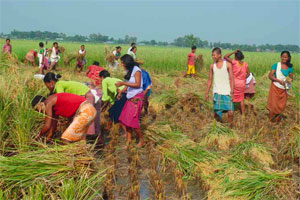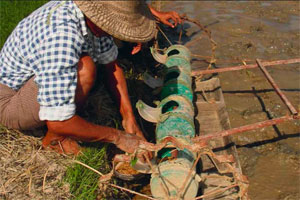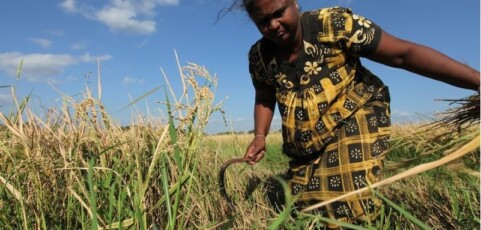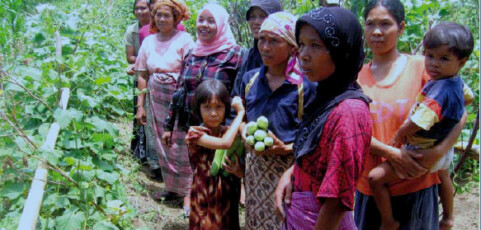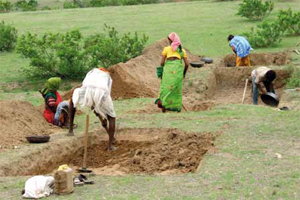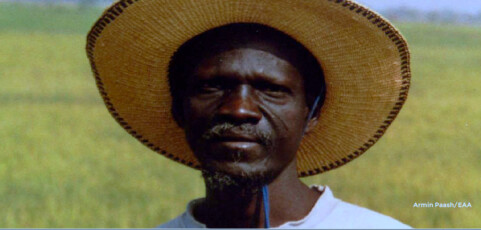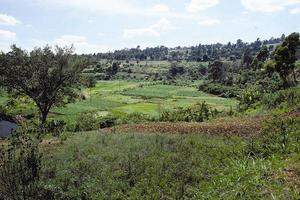It was an afternoon of 2002 when I first read about SRI. As an extension officer in the District Agriculture Development Office (DADO), I started promoting SRI in the following years in the district of Morang, Nepal.
Read more
Adoption and adaptation
Between 2004 and 2010, the Groupe de Recherche et d’Echanges Technologiques (GRET) supported the introduction and dissemination of SRI in Myanmar’s Northern Rakhine State, as part of a series of projects aiming at ensuring food security. Read more
Tipping the Balance: Policies to shape agricultural investments and markets in favour of small-scale farmers
A recent wave of large-scale land acquisitions and other commercial investment in agriculture has raised concerns that small-scale producers are being marginalized. This report takes a new look at the role of public policy and market governance in ensuring inclusive sustainable development. It also foucses on elements that can contribute to gender-equitable results. Four country case studies, conducted in Guatemala, Nigeria, Tanzania and the Philippines supports this work.
Women, families and communities in Aceh
In 2004 the province of Aceh in Indonesia was affected by a devastating earthquake and tsunami. The impact on rural communities was particularly harsh, exacerbating the existing poverty and poor living conditions caused by a long separatist conflict. A network of women farmers established under these difficult circumstances is not only benefitting its participants, but also their families and communities.
Farming Matters | 28.3 | September 2012
Photo: R. Lines-Kelly
Kaluchi Thakarwadi: Rejuvenated landscape, rejuvenated lives
Kaluchi Thakarwadi is a small, remote settlement in the district of Ahmednagar, in Maharashtra, in the semi-arid zone in the rain shadow of India’s western mountains. Rainfall is unreliable, so there is chronic water scarcity, with recurring shortages of food and fodder. Six years ago a broad watershed management programme was established, which has already had an enormous impact: a transformation from desert to a replenished watershed.
Nourishing the World Sustainably: Scaling Up Agroecology
The paper contains 12 different case studies and chapters on agroecology; other sustainable farming methods; agroecology and resilience to climatic changes; evidence of the food security potential of agroecological systems; the scaling up of agroecological innovations, with challenges and opportunities; the approaches that can be used for scaling up agroecology ; conclusions and way forward.
Improving Food Security for Vulnerable Communities in Nepal
For families living in Nepal’s remote highland regions, chronic food insecurity and hunger are part of daily life. Their own agricultural production is low; imported food is expensive; and as men migrate to find work elsewhere, women are left to manage farms and households alone. Climate change is making the situation worse.
This case study explores the reasons why Nepal is so vulnerable to food insecurity, and describes what Oxfam and its partners are doing to help improve food security for women and men living in remote parts of highland Nepal. It explores some of the innovative program activities that have been developed with these communities.
Learning in the field : Isang Bagsak helps people chart their own future
A new form of peer learning, developed jointly by researchers and development practitioners in Africa and Asia, uses face-to-face meetings, field practice, and Internet links to learn from each other about participatory approaches to research in natural resource management. Available also in French and Arabic.
The Real Green Revolution: Organic and Agroecological farming in the South
This report highlights some of the opportunities and challenges of establishing an organic farming movement that “can increase food security, reduce poverty and protect environmental resources” in the Southern hemisphere. Even though the report asserts that government policies are still needed to encourage the extension of organic farming, several positive trends are identified through a number of worldwide case studies.
Ecological Agriculture, Climate Resilience and a Roadmap to Get There
Environment and Development Series No. 14.
This paper looks at how ecological agriculture, by building healthy soils, cultivating biological diversity and improving water harvesting and management, can strengthen farmers’ capacity to adapt to climate change. Accordingly, the authors call for a reorientation of policy, funding and research priorities from the dominant industrial agriculture model to ecological agriculture.

